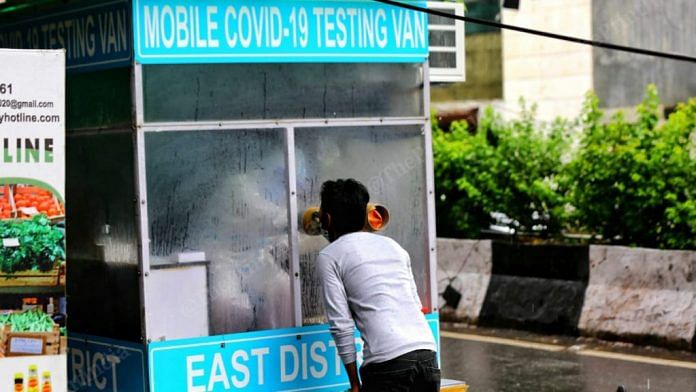New Delhi: Scientists from the Delhi-based Institute of Genomics and Integrative Biology (IGIB) claim to have developed a new method of Covid-19 testing, which they say is faster and more accurate, sensitive and cost-effective than the Reverse Transcription-Polymerase Chain Reaction (RT-PCR) test.
The RT-PCR test is currently considered the gold standard for Covid-19 diagnosis, but the wait between sample collection and results can take up to 24 hours. The IGIB team says their method is based on the mass-spectrometer — which offers structural information of chemical compounds — and takes about 30 minutes to yield results.
They say it doesn’t require a biosafety lab like RT-PCR tests, and can thus be used at public places like airports, bus stops or railway stations in kiosk-like set-ups.
“This method requires a mass spectrometer, which is available in most diagnostic labs. We take swab samples and put it directly in detergent,” said Shantanu Sengupta, senior principal scientist at IGIB.
“This method is better than the RTPCR because it is safer, more accurate, more sensitive, cost-effective in the long run and we can take multiple samples at a time,” he added.
The IGIB is one of the affiliate institutes of the Council of Scientific and Industrial Research, the premier government-run research body. The team has approached the Indian Council of Medical Research (ICMR) to secure conceptual approval for the testing method.
The researchers have also detailed their findings in a paper published 31 August in the peer-reviewed Journal of Proteins and Proteomics.
IGIB director Dr Anurag Agarwal said this method won’t work like a typical ‘testing kit’.
“It won’t go to the market like a kit. This is a test which has a clear scientific basis through an established technique called mass spectrometry which is able to pick up peptides. We won’t be making kits to sell commercially but we would be able to set up a lab to do it and apply necessary consumables, there’s no harm.”
Also Read: Modelling, testing, sero survey, vaccine — 4 lessons India learnt from 4 months of Covid
‘Several advantages’
Explaining how the method works, Dr Agarwal said the mass spectrometer is used to detect peptides or chains of amino acids that form a fundamental component of cells.
“We found peptides specific to the virus and put it on the mass spectrometer in an accelerated protocol,” Agarwal added.
Sengupta, one of the authors of the paper, said their method has several advantages over the RT-PCR test, which, roughly, requires RNA to be extracted from samples, then converted (reverse-transcribed) to DNA, and then amplified for testing.
“In RT-PCR tests, the RNA needs to be kept intact and has to be carefully handled. But, in this method, safety isn’t an issue since we put detergent, then we conduct centrifugation to digest the protein with the pepsin (an enzyme that breaks proteins into peptides), and run it in the mass spectrometer,” Sengupta said. This process, he added, only about 30 minutes.
He said the first sample can be diagnosed in 30 minutes and the second in 33 minutes and so on. “In an hour, 25 to 30 samples can be run. According to our calculations, this method can achieve over 600 to 700 samples in a day.”
Dr Agarwal added that the advantage of this method is that it is very “robust” in terms of the handling of the sample.
“It is a non-fussy test which has been optimised to run on expensive machines. But it is done fast and it doesn’t need a kit…If someone owns a spectrometer, they can start conducting this test from tomorrow itself,” he explained.
‘Higher sensitivity & lower cost’
The researchers said this method only requires 1mg of total protein sample. They claimed it is more sensitive than the RT-PCR test and not expected to give false positive results.
Dr Agarwal said this method has shown 90 per cent sensitivity, which means a correct diagnosis for 90 per cent of the positive patients it is used to test.
Researchers said the input cost is minimal since they use a “cheap enzyme” called pepsin. “The consumable cost will be around Rs 100. But if you take the cost of the machine, which is very expensive, including manpower and consumables, it will come upto Rs 180,” said Sengupta.
The RT-PCR, meanwhile, costs approximately between Rs 2,000 and Rs 4,000, with the exact price varying from state to state.
Sengupta said there was a need to introduce as many methods as possible to bolster Covid testing. “The way cases are increasing, we need to use all resources. RT-PCR is saturated and antigen tests aren’t very sensitive but we can’t depend on just RT-PCR.”
Also Read: How India increased its Covid testing capacity from 52 labs to over 1,300 in 4 months




Many such claims had been made in the past and could not pass the test. Show business is on, in this difficult time everybody wants make his name.
Without being vocal about such premature findings and scrutiny, they should keep patience and wait for its validation. Inappropriate claims has become the order of the day.
Any new test should be accepted fast if found okay and brought to the market quickly. We need to increase reliable cost-effective testing. Based on the report, this test will be doable in most labs and hence can be done even in small towns. Hope this succeeds and moves fast